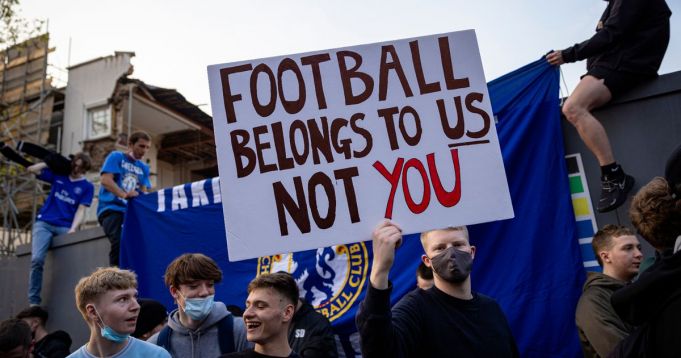On the 18th of April, European club football appeared as though it was about to undergo one of the biggest changes ever: the European Super League
While rumors had been swirling about a potential breakaway "superleague" as far back as 2018, no concrete developments had given any indication that it would become a reality. Then, when twelve of Europe's top clubs announced that they had signed contracts to join the newly created European Super League, it appeared as though the club football landscape was about to change. Thus began one of the most chaotic forty-eight-hour periods that European club football has experienced in decades.What is the European Super League
Back in 2018, German news website Der Spiegel uncovered documents from Football Leakes that detailed a potential European Super League. The idea, much the same as it is today, was for some of the biggest teams from Europe's top leagues to break away from UEFA and start their competition in 2021.The report outlined a 16-team league with 11 "core founding members" that would retain their place in the competition for twenty years. The competition would consist of a group stage followed by knockout rounds, and a final to crown the European Super League Champion. The initial reports sent shockwaves through the football world, but at the time they mostly considered to be just rumors and very few thought it would ever come to fruition.
However, on April 18th when twelve of Europe's most successful and financially powerful clubs announced they would be breaking away to form the ESL, it became clear that these were no longer baseless rumors.The twelve clubs that signed on the Super League included six from England: Manchester United, Manchester City, Liverpool, Arsenal, Tottenham Hotspur, and Chelsea; three from Italy: Juventus, AC Milan, and Internazionale; and three from Spain: Real Madrid, Barcelona, and Atletico Madrid. Notable names who decided not to sign on with this breakaway league include Paris Saint-Germain from France and Bayern Munich from Germany.
Why Establish a European Super League?
The simple answer to this question is money. While the promotion and relegation system does allow smaller clubs to dream of one day rising to the top of their country's football pyramid, the leagues are still very much controlled by two or three big clubs. These clubs are not only the most successful on the pitch, but also bring in huge amounts of revenue from television and sponsorship deals.It is no surprise, especially with the significant financial losses from the global pandemic, that the big clubs would be looking to earn more. The ESL would allow these financial powerhouses to break away from UEFA and take full control of their revenue. The prospect of the fixtures the ESL would create would certainly bring in plenty of television money, and the owners of the clubs would effectively have full control when negotiating the deals.
One big problem with this Super League however is that some of the clubs involved can hardly be called "super." Tottenham Hotspur for example may be considered a big player on financial grounds, but on the pitch, they have won just one League Cup in the past 30 years. Their arch-rivals Arsenal are also far from the powerhouse they were in the early 2000s, having failed to qualify for the UCL since 2016.
While AC Milan is the second most successful UCL club behind Real Madrid, they haven't qualified for the competition since 2013, and their cross-town rivals Inter haven't progressed past the group stage since 2011. It seems a bit absurd that these clubs would not only be in the competition right out of the gate, but as founding members, they would be exempt from being relegated from the ESL for at least twenty years.
Response and Backlash

Chelsea fans even delayed their team bus from entering the ground, and it took club legend and current technical/performance advisor Petr Cech to calm them down. While their response started as anger, it turned to joy when it was announced that Chelsea had chosen to withdraw their commitment to the ESL.
It was much the same story with all other English clubs, who all pulled out of the ESL. The attention was immediately turned to the executives who let this happen in the first place, with many releasing apologies to fans as a result of the outrage. Manchester United's executive vice-chairman Ed Woodward even resigned as a result. Not long after, Juventus, AC Milan, Internazionale, and Atletico Madrid all pulled out of the ESL, leaving just Real Madrid and Barcelona left. Real Madrid's president Florentino Perez was the main architect behind the whole Super League, to begin with, and he remains adamant that it is not over just yet.The response from politicians and football governing bodies alike was equally as fierce. British Prime Minister Boris Johnson and his Culture Secretary Oliver Dowden talked about passing legislation that would stop the ESL. FIFA President Gianni Infantino warned that players involved would have to "live with the consequences" saying that those involved may not be allowed to represent their countries during international competitions.
UEFA President Aleksander Ceferin has even talked about expelling the clubs involved that remain in European competitions from the competitions themselves. Ceferin had also said that he had been assured by Juventus chairman Andrea Agnelli that he would not be joining the ESL only to go back on his word. He then began ignoring Ceferin's phone calls when the announcement was made.
Pros and Cons of an European Super League
Now, while the ESL may appear to have been invented solely because of greed, there could be several pros that would come from its creation. The first would be that it would create exciting matchups between Europe's top clubs every week. The UCL can certainly be exciting, but the initial group stage rounds can be rather predictable. With the ESL however, fans would effectively be treated to games that you would normally only expect to see later in the knockout stages of the UCL.Another pro is that the shared revenue, and the sheer amount that it would bring in, would most likely create a lot of parody in the league year to year. Take the NFL for example in this case. One reason why the NFL can be so exciting to follow is that a team that wasn't very relevant one year is suddenly a championship contender the next. This is thanks to the shared revenue and of course to the salary cap that is instated based on your team's performance. While the financial details of the ESL have not exactly been extensively disclosed as of yet, it is to be expected that each club would be making massive amounts of money each year, which they could put towards signing the best possible players.Without meaning to sound too biased, it is pretty safe to say that there are more cons than pros when considering ESL. One problem with creating so many big matches every single week is that fans will become jaded to them. Part of the excitement to a big match, be it in the UCL or the domestic league, is the build-up to it that can sometimes start an entire month before the game. Having multiple big matchups every single week would make once very enticing fixtures seem rather dull. It would also mean that you would have some big clubs that would finish the season in the middle or even the bottom of the table.
Hardly a good place to finish for a team that would normally be fighting for a league championship. Another clear problem is the effect that it would have on smaller clubs. The absence of larger clubs in the domestic league would cut the television and ad revenue substantially, making it far more difficult for smaller clubs to survive. It would also seemingly put an end to the Cinderella stories that we have grown to love in league play. Just think of Leicester City's storybook Premier League title back in the 2015-16 season. Since then the club has become a respectable middle to a top-of-the-table contender and has qualified for the UCL on multiple occasions.Then there is the fact that many top players would gravitate towards the ESL considering that is where they could make the most money and play at the highest level. This would have a drastic effect on the domestic leagues as the quality of play would drop considerably because they would lose many of their best players. There is also the issue of the clubs that would be left out. Currently, only clubs from three countries have agreed to take part. This leaves out some very large teams that have won the UCL in the past.
There is no Portuguese, Turkish, German, or French teams involved. Even Red Star Belgrade and Celtic have won European Cups in the past, but the chances of them getting into the ESL are near impossible. Lets also not forget the Dutch, whose top club Ajax have not only won four European Championships in their history and produced some of the best players in the game but who just a few years ago made the semi-finals of the UCL, beating Real Madrid 4-1 at the Bernabeu on the way.
Effects on Roma and Lazio
Roma and Lazio are in a similar boat. Both of them are respectable sides in Serie A who have consistently finished in the top five over the past few decades. Now, one could argue that with the absence of some of the top clubs in the domestic leagues, it would be easier for other, smaller clubs to win championships. However, what’s the point of winning a championship if you know that you are not the best team in the league? If Roma or Lazio were to win the Scudetto, it wouldn’t mean as much if they didn’t have to beat out the big three teams in the country to win it. Both Roma and Lazio have been considered clubs that would be next in line for qualification to the ESL, with Napoli being named in that same group. However, both Roma and Lazio are not experiencing the success they were hoping for this season, and are certainly not on the same grounds financially as Juventus, Manchester United, or Liverpool. Roma's new ownership may put them in the mix for a spot in the ESL, but their new owners, the Friedkin's, have made it clear that they will not be joining the competition, much to the joy of Roma supporters.In the aftermath of the announcement of the ESL, Roma along with ten other Serie A clubs co-signed a letter asking for sanctions to be imposed on the three that tried to break away. However, one of the clubs that did not sign this letter was Lazio, with the others being Napoli, Fiorentina, Atalanta, and Hellas Verona. Why these clubs chose not to sign the letter is anyone's best guess and doesn't seem all too significant. What is significant, however, is the fact that for now, the ESL is on standby. The fans made their voices heard, and in a very short period, the biggest story European football has seen for some time has fizzled out. If Florentino Perez has made one thing clear though, it's that he will try again. The ESL saga is not over yet, but when it does eventually enter into the headlines again, we can be sure what the response will be like.
















